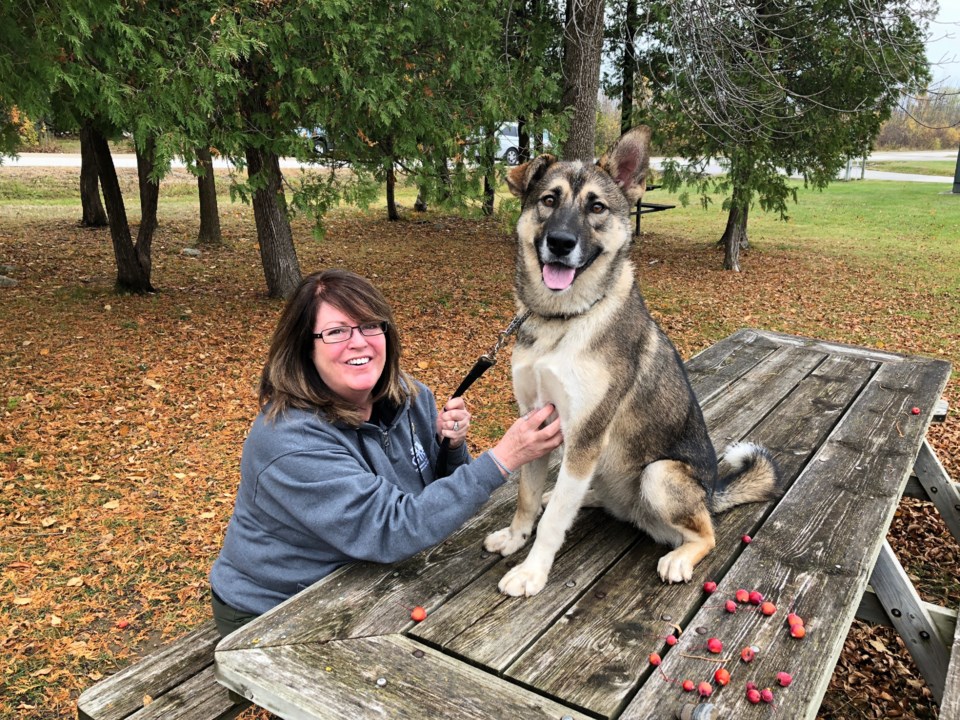The cats and dogs at the local animal shelter are the reason some students stayed in school last year.
At least, they were part of the reason.
In late 2017, the Georgian Triangle Humane Society started a pilot project called Humane Education, which received a start-up grant from the Ontario Trillium Foundation.
Karen Marsh, a former secondary school teacher, was hired to plan the curriculum and run the program.
“The focus is to improve social and emotional skills in at risk youth, and all youth who participate in the program,” said Marsh. “Sonya [Reichel], our executive director, needs to be recognized as a person who saw the importance of this program in the community and in our shelter. She is an incredibly forward-thinking individual who brought this program to the shelter and set it in motion.”
The results of the pilot program have led to another grant this year ($300,000 over 33 months) to continue and expand the work begun in the pilot phase.
The program has been divided into three streams.
The first component is in-class workshops. Marsh delivers a series of four 90-minute lectures, mostly to students in Grade 6, 7, and 8. For a fifth session, the students come to the shelter for a tour and interact with the animals. In the end, students receive a junior welfare certificate.
Similarly, the second stream is an after-school Junior Animal Welfare course, which also includes a course on pet-sitting.
In those two courses, Marsh teaches on the history of pets, the cruelty connection from animal abuse to domestic violence and bullying, kindness, animal welfare, veterinary care, and responsible pet ownership.
She said she’s received feedback from teachers who say there are students known for their lack of participation and general disinterest in school who participated in Marsh’s classes and are now handing in homework and participating in their other classes.
“I’ve spent 24 years teaching in a classroom and I’ve never experienced more tangible success than this in my whole career,” said Marsh.
An outside assessment of the pilot project indicated an 18 per cent increase in social and emotional skills in kids who participated in the animal welfare courses either in or after school.
“These kids really want to talk about animals, whether it’s their own pets or maybe some abuse they’ve witnessed,” said Marsh.
She sees the greatest impacts, however, in the third stream of the program – the one-on-one delivery for at-risk students in the alternative learning program. Statistics for this program indicated an 18-25 per cent increase in social and emotional skills in the students who participated.
“These are students in the last stage of options for finishing high school,” said Marsh.
The teens in this program often struggle to get out of bed in the morning to go to school. They face struggles such as eating disorders, anxiety, crippling fear, teen pregnancy, instability at home, abuse, and in some cases they are homeless.
“Those students really identify with a homeless animal,” said Marsh. “The studies are overwhelming – when you connect someone in need with an animal, it opens up so many possibilities.”
Marsh saw students come to the shelter, connect with an animal there, and let down the walls they had put up to keep people out. Where they were silent before, they opened up to Marsh or other shelter staff about their fears and failures. In many cases, Marsh and her team were able to help those students find more programs to help where the student needed it most.
One student, said Marsh, suffered debilitating anxiety, and depression. The student joined the program and was introduced to a senior cat surrendered to the shelter. The cat was old, sick, and dying. This student, who couldn’t get out of bed most days, arrived at the shelter everyday to sit with the dying cat, petting it and comforting it in its last days.
One student initially wouldn’t enter the building due to a fear of dogs. The student was non-verbal and had tried for years, with no success, to get a part-time job. Marsh and the shelter volunteers started by introducing the student to cats. One year later, the student would sit on the couch of a meet-and-greet room petting the shelter’s latest canine intake waiting for adoption. The student began speaking in that same year, and was able to get a part-time job.
“The student’s support team credited the Humane Education program with that success,” said Marsh.
The credit, said Marsh, goes to the whole GTHS team, animals and people.
While petting a purring cat curled up on your lap is a calming experience that helps break down barriers, it’s the volunteers and staff at the shelter who were there as the kind, listening ears when the barriers came down.
“The dedication of the people here blows my mind,” said Marsh. “Animals will always warm your heart, that’s a given. The staff and volunteers embrace whoever I bring in here. I hope the kids who participate in this program become like them. They are compassionate toward these animals in need and that naturally transfers to people. That’s what I want the world to become.”
This year, during the pilot project, the Humane Education program reached 1,350 students in the area. Marsh is hoping to reach 2,500 kids over the next 33 months (the program begins again Nov. 14). The Humane Education program now also includes partnerships with Elephant Thoughts and the Ontario Society for the Prevention of Cruelty to Animals (OSPCA). Through the partnership with the OSPCA, Marsh is hoping to make the program available to animal shelters and schools across the province.
For more on the Humane Education program or to contact Karen Marsh, click here.




